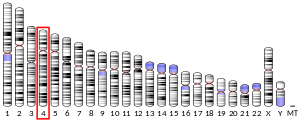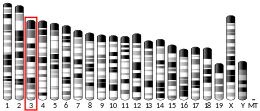RRH
Peropsin, a visual pigment-like receptor, is a protein that in humans is encoded by the RRH gene.[5][6]
Peropsin is an opsin and so belongs to the guanine nucleotide-binding protein (G protein)-coupled receptors. Peropsin genes have seven-exons as neuropsin and RGR-opsin genes.[6]
Phylogeny
The peropsins are one of the four subgroups of the Go/RGR opsins, also known as RGR/Go or Group 4 opsins. Go/RGR opsins are one of the four major groups of type-II opsins, also known as metazoan or animal opsins. The Go/RGR opsins consist of four groups: The Go-opsins, the RGR-opsins, the peropsins, and the neuropsins. Animal opsins belong to four classes: C-opsins (ciliary), R-opsins (rhabdomeric), Cnidops (cnidarian), and Go/RGR-opsins. Three of these subclades occur only in Bilateria (all but Cnidops). However, the bilaterian clades constitute a parphyletic taxon without the Cnidops.[7][8]
References
- 1 2 3 GRCh38: Ensembl release 89: ENSG00000180245 - Ensembl, May 2017
- 1 2 3 GRCm38: Ensembl release 89: ENSMUSG00000028012 - Ensembl, May 2017
- ↑ "Human PubMed Reference:".
- ↑ "Mouse PubMed Reference:".
- ↑ Sun H, Gilbert DJ, Copeland NG, Jenkins NA, Nathans J (Sep 1997). "Peropsin, a novel visual pigment-like protein located in the apical microvilli of the retinal pigment epithelium". Proceedings of the National Academy of Sciences of the United States of America. 94 (18): 9893–8. doi:10.1073/pnas.94.18.9893. PMC 23288. PMID 9275222.
- 1 2 "Entrez Gene: RRH retinal pigment epithelium-derived rhodopsin homolog".
- ↑ Porter ML, Blasic JR, Bok MJ, Cameron EG, Pringle T, Cronin TW, Robinson PR (Jan 2012). "Shedding new light on opsin evolution". Proceedings of the Royal Society B: Biological Sciences. 279 (1726): 3–14. doi:10.1098/rspb.2011.1819. PMC 3223661. PMID 22012981.
- ↑ Liegertová M, Pergner J, Kozmiková I, Fabian P, Pombinho AR, Strnad H, Pačes J, Vlček Č, Bartůněk P, Kozmik Z (2015). "Cubozoan genome illuminates functional diversification of opsins and photoreceptor evolution". Scientific Reports. 5: 11885. doi:10.1038/srep11885. PMC 5155618. PMID 26154478.
Further reading
- Harrington JJ, Sherf B, Rundlett S, Jackson PD, Perry R, Cain S, Leventhal C, Thornton M, Ramachandran R, Whittington J, Lerner L, Costanzo D, McElligott K, Boozer S, Mays R, Smith E, Veloso N, Klika A, Hess J, Cothren K, Lo K, Offenbacher J, Danzig J, Ducar M (May 2001). "Creation of genome-wide protein expression libraries using random activation of gene expression". Nature Biotechnology. 19 (5): 440–5. doi:10.1038/88107. PMID 11329013.
- Bellingham J, Wells DJ, Foster RG (Jan 2003). "In silico characterisation and chromosomal localisation of human RRH (peropsin)--implications for opsin evolution". BMC Genomics. 4 (1): 3. doi:10.1186/1471-2164-4-3. PMC 149353. PMID 12542842.
- Barrios-Rodiles M, Brown KR, Ozdamar B, Bose R, Liu Z, Donovan RS, Shinjo F, Liu Y, Dembowy J, Taylor IW, Luga V, Przulj N, Robinson M, Suzuki H, Hayashizaki Y, Jurisica I, Wrana JL (Mar 2005). "High-throughput mapping of a dynamic signaling network in mammalian cells". Science. 307 (5715): 1621–5. doi:10.1126/science.1105776. PMID 15761153.
- Rivolta C, Berson EL, Dryja TP (2007). "Mutation screening of the peropsin gene, a retinal pigment epithelium specific rhodopsin homolog, in patients with retinitis pigmentosa and allied diseases". Molecular Vision. 12: 1511–5. PMID 17167409.
This article incorporates text from the United States National Library of Medicine, which is in the public domain.




